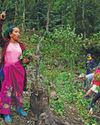
SOME THREE decades ago, at the 1992 Earth Summit in Brazilian city of Rio de Janeiro, the world agreed on the links between climate change, desertification and biodiversity loss, and resolved to protect nature. Still, the planet has continued to lose an estimated 2-6 per cent of its biodiversity every decade.
The Intergovernmental SciencePolicy Platform on Biodiversity and Ecosystem Services (IPBES), a Bonnbased intergovernmental body that assesses the state of the planet's biodiversity and ecosystems, has looked for solutions to arrest this loss of biodiversity for the past three years. In this period, more than 250 experts have looked at hundreds of research papers, unpublished data and case studies to prepare two reports "Nexus Assessment" and "Transformative Change Assessment". The reports were discussed and agreed upon at the 11th plenary of IPBES held in December 2024 in Namibia. Only the summaries of the report are available so far and the final reports are expected later in 2025.
The "Nexus Assessment" report is a "thematic assessment of the interlinkages among biodiversity, water, food and health". The report, for the first time, identifies and evaluates five nexus elementsbiodiversity, water, food, health and climate and provides solutions and policy options to optimise co-benefits across different environmental crises. The "Transformative Change Assessment" report is a "thematic assessment of the underlying causes of biodiversity loss, determinants of transformative change and options for achieving the 2050 vision for biodiversity" which seeks to "live in harmony with nature". It details the reorganisation needed in technology, economics and society to achieve a just, sustainable world.
This story is from the {{IssueName}} edition of {{MagazineName}}.
Start your 7-day Magzter GOLD free trial to access thousands of curated premium stories, and 9,000+ magazines and newspapers.
Already a subscriber ? Sign In
This story is from the {{IssueName}} edition of {{MagazineName}}.
Start your 7-day Magzter GOLD free trial to access thousands of curated premium stories, and 9,000+ magazines and newspapers.
Already a subscriber? Sign In

On shaky ground
Despite reporting net gains in green cover, the latest forest survey shows degradation of natural forests, particularly in ecologically sensitive hotspots

Burden of proof
The government's drive for e-KYC verification to ensure rightful targeting of beneficiaries has proved exclusionary for many

Rupee slide impacts agricultural trade
THE UNION Cabinet on January 1, 2025, approved the extension of a subsidy package of ₹3,500 per tonne on di-ammonium phosphate (DAP) for companies.

THE 500 GW SWITCH OVER
Coal is the king of energy at present. India needs to dislodge it with clean energy for an equitable green transition

MANIFESTING 500 GW
Ensure that renewable energy is available round the clock.Establish a viable market and reward those who take lead

Lifting a curse
How Gangabai Rajput helped her water-scarce village in Madhya Pradesh let go of superstition and revive an ancient waterbody

HOLD THEM SACRED
The Supreme Court has recommended that the Union government create a comprehensive policy for the governance and management of sacred groves across the country

REPORT CARD 2024
Coal is still the king in terms of electricity generation. But new renewables, mainly solar power, have shown an impressive growth

'India a laboratory for seismologists'
India is no stranger to earthquakes. In recent memory, Latur and Bhuj districts in Maharashtra and Gujarat witnessed devastating tremors in 2003 and 2001 respectively. Such quakes leave clues that can aid preparations for future events, say seismologists KUSALA RAJENDRAN, professor, Indian Institute of Science, and CP RAJENDRAN, adjunct professor, National Institute of Advanced Studies. The Rumbling Earth-The Story of Indian Earthquakes, captures their work on historical as well as recent quakes. In an interview with ROHINI KRISHNAMURTHY, they discuss the science of earthquakes, why the Himalayas are due for a huge event and why prediction remains a challenge. Excerpts:

Capturing Siang
As India pushes for a mega-dam on the Siang river to counter China's upstream projects, the Adi tribal community of Arunachal Pradesh fears losing ancestral land